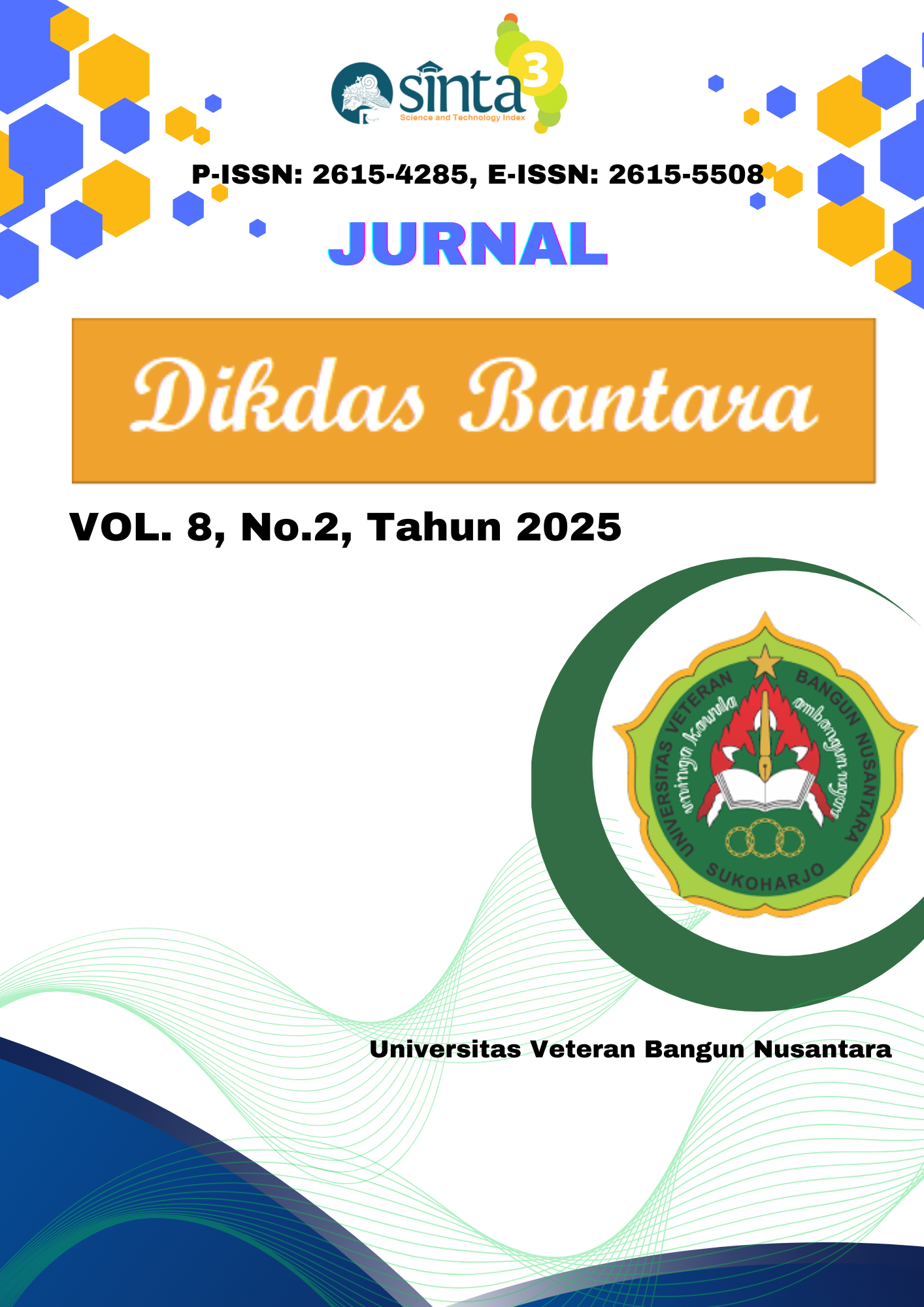APPLICATION OF ECOLITERACY IN IMPROVING STUDENTS' GREEN BEHAVIOR IN ELEMENTARY SCHOOLS
DOI:
https://doi.org/10.32585/dikdasbantara.v8i2.6938Abstract
The implementation of ecoliteracy in elementary schools is an important strategy in shaping students' green behavior from an early age as part of character education and ecological awareness. This study aims to describe the application of ecoliteracy in improving students' green behavior at SD Negeri Gumpang 01, a school that has won the Adiwiyata School award at the Central Java Province level. The method used was descriptive qualitative research with a naturalistic approach, involving the principal, teachers, and students as research subjects. Data collection was conducted through in-depth interviews, observation, and documentation, with interactive analysis techniques and triangulation of sources and methods to ensure data validity. The results showed that the implementation of ecoliteracy was carried out through integration in the local wisdom-based curriculum, project-based learning, extracurricular activities, collaboration with parents and communities, and utilization of media and technology. This strategy clearly encourages increased student self-awareness, changes in attitudes and habits, and a growing sense of social responsibility for the environment. The implementation of ecoliteracy not only increases students' understanding of the importance of protecting the ecosystem, but also internalizes ecological values into daily life. Thus, learning integrated with environmental values can form a sustainable school culture. The implementation of ecoliteracy not only improves students' understanding of the importance of maintaining the ecosystem, but also internalizes ecological values into daily life. Thus, learning integrated with environmental values can form a sustainable school culture and strengthen the character of environmental care in elementary school students.
Downloads
Downloads
Published
Issue
Section
License
Copyright (c) 2025 Bayu Sapto Nugroho, Bambang Sumardjoko, Anatri Desstya, Laili Etika Rahmawati, Choiriyah Widyasari

This work is licensed under a Creative Commons Attribution-ShareAlike 4.0 International License.
The copyright to this article is transferred to Jurnal Dikdas Bantara if and when the article is accepted for publication under Creative Commons Attribution-ShareAlike 4.0 International License. The undersigned hereby transfers any and all rights in and to the paper including without limitation all copyrights to Jurnal Dikdas Bantara. The undersigned hereby represents and warrants that the paper is original and that he/she is the author of the paper, except for material that is clearly identified as to its original source, with permission notices from the copyright owners where required. The undersigned represents that he/she has the power and authority to make and execute this assignment.We declare that:
1. This paper has not been published in the same form elsewhere.
2. It will not be submitted anywhere else for publication prior to acceptance/rejection by this Journal.
3. A copyright permission is obtained for materials published elsewhere and which require this permission for reproduction.
Furthermore, I/We hereby transfer the unlimited rights of publication of the above-mentioned paper in whole to Jurnal Dikdas Bantara. The copyright transfer covers the right to reproduce and distribute the article, including reprints, translations, photographic reproductions, microform, electronic form (offline, online), or any other reproductions of similar nature. The corresponding author signs for and accepts responsibility for releasing this material on behalf of any and all co-authors. After submission of this agreement signed by the corresponding author, changes of authorship or in the order of the authors listed will not be accepted.
Retained Rights/Terms and Conditions
1. Authors retain all proprietary rights in any process, procedure, or article of manufacture described in the work.
2. Authors may reproduce or authorize others to reproduce the work or derivative works for the author’s personal use or for company use, provided that the source and the Jurnal Dikdas Bantara copyright notice are indicated, the copies are not used in any way that implies Jurnal Dikdas Bantara endorsement of a product or service of any employer, and the copies themselves are not offered for sale.
3. Although authors are permitted to re-use all or portions of the work in other works, this does not include granting third-party requests for reprinting, republishing, or other types of re-use.



















